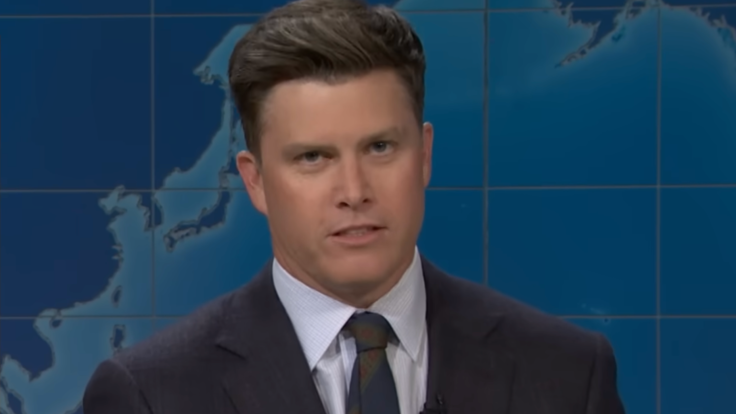'Did He Really Say That?' SNL's Colin Jost Shocks Audience With Brutal Trump And Milei Joke
A single line on 'Weekend Update' — and a single clap — sparked debate about satire, historical analogy

Colin Jost's 'Weekend Update' landed a line about US President Donald Trump and Argentina that left the studio suddenly, awkwardly quiet.
On 18 October 2025, during Saturday Night Live's Season 51 episode hosted by Sabrina Carpenter, Jost used his 'Weekend Update' desk to poke at President Trump's recent financial backing of Argentina, quipping that 'if history is any guide, a lot of Trump officials will end up fleeing to Argentina', a reference that explicitly echoed the post-war flight of Nazi war criminals to South America.
The remark was followed by an uncomfortable pause and Jost's self-aware retort, 'OK, one clap'. The clip of the exchange and the full segment are available from NBC's SNL archive and the show's official channels.
The Joke and the Moment
The line formed part of a rapid-fire 'Weekend Update' that also touched on President Trump's commutation of George Santos and other current headlines. Jost's remark invoked a grim historical comparison to make a political point, a classic structure of late-night satire, yet its reception in the studio suggested many viewers found the analogy too dark or too blunt for the moment.
The full 'Weekend Update' video and subsequent clips circulated on official SNL platforms and on YouTube, allowing viewers to see the precise timing of Jost's delivery and the audience response.
Jost immediately acknowledged the reaction and moved on, a tactic anchors often employ when a joke fails to land. That manoeuvre, quick recovery rather than doubling down, is standard in live comedy, but it has not prevented scrutiny in the hours that followed.
Multiple outlets and commentators cited the same minute-long clip as the source material for their analysis, underlining how a brief televised moment can inflate across social media and news cycles.
Audience Reaction and Online Backlash
Reactions split along familiar fault lines. Some critics argued the Nazi reference was gratuitous and offensive, saying the invocation of Holocaust imagery should be handled only with exceptional care.
Others defended Jost on free-speech and satire grounds, pointing out that political comedy has long used extreme analogy to highlight perceived abuses of power. Social clips showed only a tepid studio response, reportedly a single audible clap, which outlets used to illustrate the awkwardness; commentators on broadcast and cable news replayed and dissected Jost's quick 'OK, one clap' recovery.
Online, the exchange sparked heated debate. Some viewers demanded editorial accountability from SNL, while others accused critics of overreach and defended the show's right to provoke. That debate quickly fed into partisan media ecosystems, with conservative outlets emphasising the misfire and more liberal outlets contextualising the joke within SNL's long tradition of biting political satire.
The viral clip's trajectory demonstrates how a live broadcast moment can be refracted into competing narratives almost instantly.
Political Context and Implications
To understand why the line landed as it did, it helps to look at the policy backdrop. In mid-October, the White House announced and defended measures to provide Argentina with a significant financial lifeline, described widely by officials and analysts as a £15 billion ($20 billion) swap line and the possibility of additional private or sovereign financing that could expand that figure.

The show's gag directly referenced that bailout and the perception among critics that Washington's support for Argentine President Javier Milei was politically motivated.
That substantive policy context matters. When comedians comment on government decisions, their bar for resonance rises: audiences expect satire to illuminate the policy or moral absurdity beneath headlines, not merely to shock.
Critics of the bailout, including some members of Congress and agricultural groups worried about trade impacts, seized on both the policy and the SNL moment to press their arguments. Supporters of the show, meanwhile, argued that satire's role is precisely to call out perceived hypocrisy and to force uncomfortable comparisons in public conversation.
'Weekend Update' aimed for satire; the studio's pause offered an unvarnished reminder that even in comedy the line between incisive and injurious can be perilously thin.
© Copyright IBTimes 2025. All rights reserved.





















